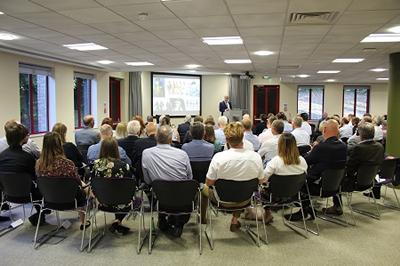Do company bosses need ‘the warrior spirit’? University of Southampton Business School offers a military perspective to leadership

Can business leaders learn from the military? General Sir Richard Barrons discussed leadership in a volatile and ever-changing environment at the latest Southampton Business School.
General Barrons served in Northern Ireland, the Balkans, Iraq and Afghanistan. He has also held several of the most senior operational command and staff roles until stepping down from fulltime duties in 2016. A graduate of the University of Oxford, he frequently lectures on the subject and has written on senior leadership.
“Although I was speaking in a military context, there is not much difference between the requirements of the armed forces and the business world, we’re talking about strategy, coping with adversity and ultimately getting people to do what they don’t want to do as well as making the most of limited resources – no General has ever had all the money he wants.”
General Barrons acknowledges business leaders may not immediately see the link: “In the 21st century, the military are not in the public eye. There’s a mythology, usually rooted in Second World War films, Dad’s Army or Blackadder and fewer families have a living member who has fought in conflict. The Army, Royal Navy and RAF may seem remote from companies but there are more parallels between military and civilian leadership than you might think.”
Britain’s armed forces have faced many challenges in the turbulent years following the fall of the Berlin Wall: “Of course the warrior spirit is still all-important. Being prepared to kill people and break their stuff, if needs be, is still our role. But, in other settings, members of the armed forces are deployed to help people and stabilise a situation and officers and NCOs must adapt. In the 1990s, we were very focused on peacekeeping in the Balkans. In Iraq and Afghanistan the requirement changed to fighting at a tactical level. Then in Ukraine in 2014, around a thousand soldiers were killed in 15 minutes by Russian technology so we now need to adjust ourselves back to cope with situations where casualties can come in much greater numbers,” he explains.
“Officers need the adaptability, the character and the stretch to deal well with uncertainty and unfamiliar situations that may be risky. Our challenge is to teach those skills.”